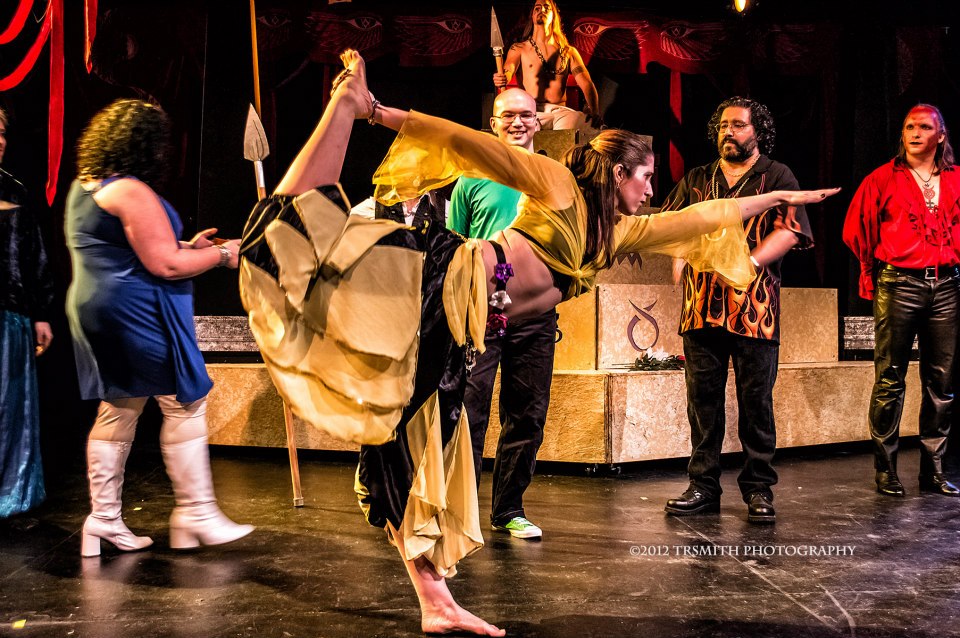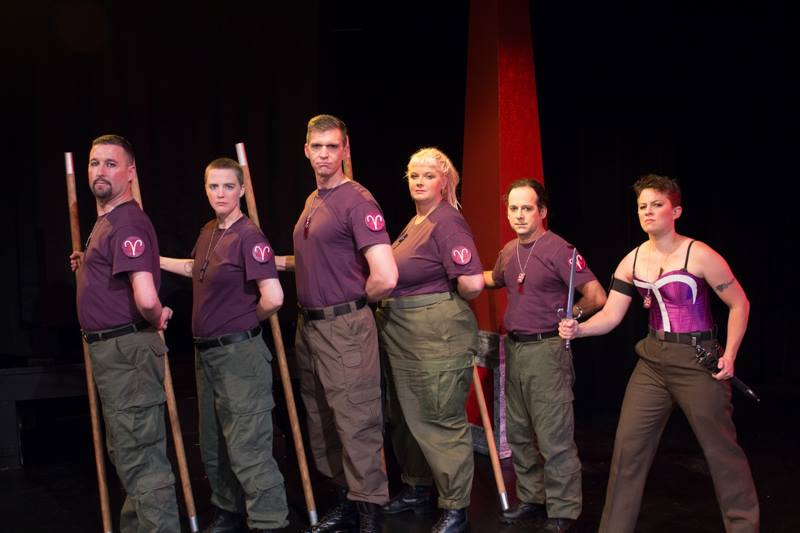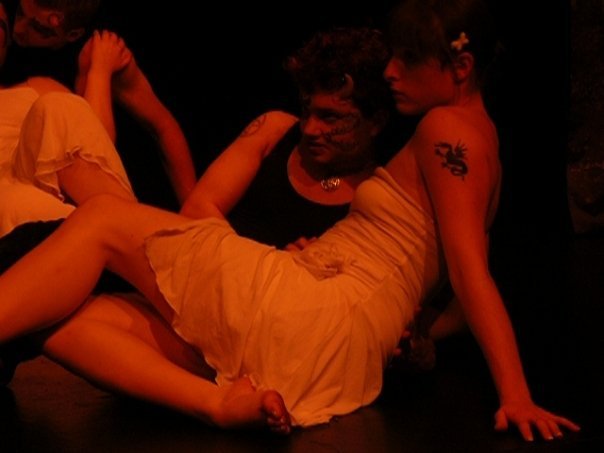The Primal Stirrings
Becoming Godlings
Vandimir McAirt, one of the principal figures in the reemergence on The Rites of Eleusis in the San Francisco area in 1980, relayed a story about the ritualists, and how they used to refer to themselves as “Godlings”. A term they coined, which you might interpret as ‘humans learning the first steps in experiencing their own divinity’. As someone who has approached this material with my own sense of naivete and wonder, I think the term is appropriate. It seems to embrace the awakening of the titanic forces in the subconscious mind, and their eventual gestation and birth into consciousness, by stages, with all the humor and awkwardness that goes with it.
Seeing as this blog is about Doing Rites Right, rather than just tell you funny stories about how awesome it was for me to do the Rites, it is time to provide a little guidance for those who would like to embark on this wild adventure.

My principal advice is: “Do it!” Start from “Yes”, and then work out the detail.
If you haven’t done so already, this is your invitation to become “Godlings”. This particular post is going to start with the assumption that you are just starting out, and want to know where to begin. In the coming days I will be providing more in-depth recommendations for larger productions. For now, let’s start simple. For your first time out, I recommend the following steps.

1. Find your cohort
If the Rites are something you want to do, and you want to do them with other people, you will need to find your team, or pantheon, if you will. Start by reaching out to friends and communities you are already familiar with, who may have an interest in the material. If you are working with a large or established group, be willing to approach leadership with your ideas, and see if they can offer support. Ask questions, talk about options, and find out who among that cohort has a talent they have been looking for an outlet to express.
Remember that the original Rites of Eleusis staged by Crowley had room for solo music and dance. While violin is beautiful, one might also express divine music with flute, or cello, or piano, or banjo. Along the same lines, there are many types of dance, but also martial arts, or gymnastics, or aerial work. Unless you choose to do so, you are not limited to the original format. See one of our previous posts, and, “drive it like you stole it.”
And if there is no burgeoning musician in your midst? Don’t let that stop you for a moment! Play some music on a stereo and add more dance!

2. Select a director
This seems simple, but it cannot be overstated. Nothing will get any production lost in the weeds faster than failure to have someone making decisions. Often the choice will be obvious, but never let it go unsaid. Having one point of contact when problems inevitably arise is crucial to being successful. Your director will probably be part of building the cohort. Perhaps it is you! In either event, as you enlarge your cohort, talk with the team members about what they can do, and think about ways you can adapt a presentation to suit their skills. Not only will this improve the quality of your presentation, It will give people a chance to bring their genius to the Rites, which is always a win-win. The director will ultimately be the person with a vision, deciding which of these gifts to incorporate into The Rites, and their decision should be respected. (Never argue with the director! Talk politely after rehearsal.)
When contemplating the need for a director and who to select, remember: we may all be manifestations of the divine, but if mythology has taught us anything, it is that Gods squabble! They have a hierarchy. You will need one, too. Do not select a director who is conflict avoidant.

3. Have a planning meeting
Once you have the core of your team, and a director with at least the beginnings of a vision, get together and develop your plan. Set aside two hours, be someplace comfortable. Provide snacks.
The things you need to talk about (A through F):
A. Artistic Vision: This is where the director explains what the overall presentation is going to look like. Don’t get too bogged down in details. For a first production, 10 to 15 minutes should cover this section.
Paint with broad strokes to start with.
B. Budget: Do you have a budget for props, sets, rehearsal space or a theater? Do some planning ahead of time, and depending on your vision, have a rough idea what you will need to spend. Then add 15% for incidentals. Another 15 minutes.
C. Casting: Here you go through your cast list and assign the roles. Talk about your vision, whether you expect the cast to be off-book, or if they can work with scripts in their hands. Talk about costuming expectations, and who might already have costume elements, but keep it short. For a first production, it is best to be on-book. Allow 15 minutes.
D. Dates: This is the big one, the central purpose of your meeting. Talk to your principals about the dates you would like for your presentation. Find the block-out dates for cast who may be traveling, or already have plans.
If your presentation will be in a private home or theater, you will need to check availability can confirm the dates after the meeting, so maybe have several to choose from. Also, this is a good time to decide if this will be a public, or private event.
Additionally, plan your rehearsal dates. I have a handy guide for amount of rehearsal time required. Each of the Rites runs a little more than an hour if not embellished.
Readers-Theater: One hours of rehearsal per 20 minutes of stage time.
On-Book: One hour of rehearsal per 15 minutes of stage time.
Memorized: One hour of rehearsal per 10 minutes of stage time.
Embellished: One hour of rehearsal per 5 minutes of stage time.
Using the above rules, a “Readers-Theater” style presentation, three one hour rehearsals would be adequate. For an “On-Script” presentation, four one hour rehearsals is called for. For a memorized production, 6 rehearsals is optimal, with everyone off book for the final two. For an embellished production, which will probably run closer to two hours, you will need to plan as many as a dozen two hour rehearsals.
Note that I am talking about actual rehearsal time. You can plan for 15 minutes at the beginning and end of meetings to discuss related matters like costumes, props, etc. This section of your meeting will be the bulk of your time, and will likely take 45 minutes to an hour.
E. Effects: Talk about what you envision for lighting, music, or other practical effects, and who will be pulling these items together. Emphasize safety, especially with fire. And plan to rehearse your effects, as testing your vision during the performance can lead to disaster. For a first production this will likely take 15 minutes to half an hour.
F. Fallout: This is a ritual. There are large forces that will be invoked. They will impact the way that you, your cast, and crew will view reality for the remainder of their incarnation.
Plan for time to decompress. Schedule a few minutes at the end of rehearsal to ground. Talk about a self-care plan. Discuss the best strategies that your cast members have for coping with stress. Make certain that everyone understands that they need to show up for rehearsal well fed, rested and ready. This is another 15 minutes and is a nice subject to close your meeting on.
It is a lot to discuss, but planning ahead will make the next steps run smoothly!

4. Readers-Theater
Whether you do so publicly or not, I recommend doing a dramatic read through of The Rite you have chosen to perform with the cast. This will make certain everyone is acquainted with the flow of the material, and allow them to build some chemistry together.
This can be an early rehearsal, or this may be your first public performance.

5. Presentation
Once you have everything in order, and you are ready to present, you need to be aware of a simple fact: Nothing goes as planned. Creation is an act of will, and the manifestation of will implies force. There are going to be challenges, changes, road-blocks, tears, distractions, unruly cast members, flaky theaters, traffic, and at least one person will drop out. This is normal. Roll with it.
To the director I say: Mastery over others is power, mastery over yourself is strength. Which is another way of saying, don’t despair, don’t lose control, just adjust. Don’t take anything personally.

6. Review and Relax!
There is nothing like post ritual bliss. The Rite is like a marriage ritual, and you should enjoy your honeymoon. Plan some time afterward to look at what you accomplished, celebrate your victories, and learn from your mistakes. And do not neglect the cast party.
Trust me on that last one. If you fail to plan a cast party to ground out your team, they will likely show up at your house, order a pizza, and plan their own. It might get weird. Those invoked of Gods, even for a short period of time, will often develop an appetite for mischief, especially toward those fellow performers that have been invoked of their compliments, or their nemeses.
For those who have celebrated these Rites themselves, what did we miss? Comment below with your suggestions!